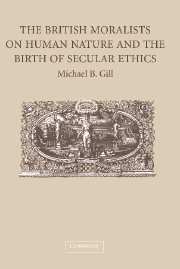Book contents
- Frontmatter
- Contents
- Introduction
- PART ONE WHICHCOTE AND CUDWORTH
- 1 The Negative Answer of English Calvinism
- 2 Whichcote and Cudworth's Positive Answer
- 3 Whichcote and Cudworth on Religious Liberty
- 4 Rationalism, Sentimentalism, and Ralph Cudworth
- 5 The Emergence of Non-Christian Ethics
- PART TWO SHAFTESBURY
- PART THREE HUTCHESON
- PART FOUR DAVID HUME
- Notes
- Bibliography
- Index
5 - The Emergence of Non-Christian Ethics
Published online by Cambridge University Press: 29 July 2009
- Frontmatter
- Contents
- Introduction
- PART ONE WHICHCOTE AND CUDWORTH
- 1 The Negative Answer of English Calvinism
- 2 Whichcote and Cudworth's Positive Answer
- 3 Whichcote and Cudworth on Religious Liberty
- 4 Rationalism, Sentimentalism, and Ralph Cudworth
- 5 The Emergence of Non-Christian Ethics
- PART TWO SHAFTESBURY
- PART THREE HUTCHESON
- PART FOUR DAVID HUME
- Notes
- Bibliography
- Index
Summary
In the past two chapters, we've charted the role played by Whichcote and Cudworth's Positive Answer in the development of religious liberty and moral rationalism. We will now see that their version of the Positive Answer was instrumental to another intellectual development as well – a development at least as momentous as the other two. But unlike religious liberty and moral rationalism, this third development was something to which Whichcote and Cudworth may have contributed unintentionally. Indeed, this third development was something that Whichcote almost certainly would have preferred to squelch. Cudworth's attitude may have been more ambivalent.
The third development was the disengagement of moral philosophy from Christian Protestantism. Theological commitments remained always at the center of Whichcote and Cudworth's view of morality and human nature. But their Positive Answer proved to be incompatible with the conception of Christianity that had defined the mainstream of seventeenth-century English thought. So as Whichcote and Cudworth's Positive Answer gained philosophical ground, the mainstream Christian view began to recede.
In this chapter, I explain the conflict between the mainstream Christianity of seventeenth-century England and Whichcote and Cudworth's Positive Answer. In Section A, I give a general overview of the conflict. In A, I explain how the conflict manifested itself in Whichcote's sermons and his (determined but ultimately failed) attempts to resolve it. In B, I explain how the conflict manifested itself in the work of Cudworth and his (less determined but equally failed) attempts to resolve it.
- Type
- Chapter
- Information
- Publisher: Cambridge University PressPrint publication year: 2006



